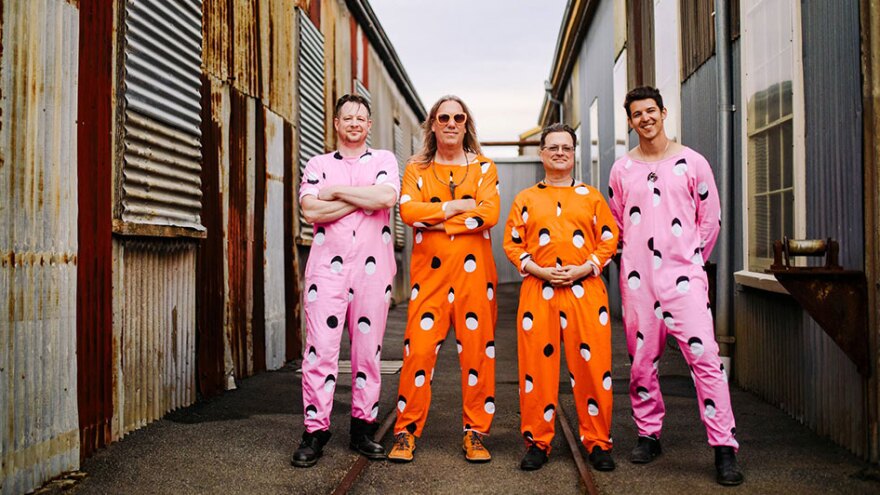Brian Ritchie isn’t the type to romanticize the past. When I bring up the 30th anniversary of 3, the Violent Femmes’ oft-overlooked fourth album, his response is as direct as the album itself: “We just convened in the recording studio without having rehearsed the songs or anything and made the album.”
It’s fitting, really. 3 was the sound of a band getting back together not with a triumphant press release but a shrug and a handful of songs. They hadn’t made a record in a few years. They didn’t have a tour booked. There were no grand plans. “We didn’t split up for any particularly good reason,” Ritchie says. “It was inevitable that we’d get back together.”
Released in 1989, 3 followed the more polished Blind Leading the Naked (produced by Talking Heads’ Jerry Harrison) and marked a return to the raw spontaneity of their debut. That wasn’t necessarily the plan. “We didn’t intend to do it that way—it just turned out that way,” Ritchie shrugs. “The songs were so simple that we ended up doing most of them as a trio.”
The result was an album that—while rarely discussed with the same reverence as Violent Femmes or Hallowed Ground—still resonates with fans and even the band themselves. “It’s surprising, but there are quite a few songs from that album that we still play live,” Ritchie notes. “Not every night, but they come out.”
Take “Nightmares,” the album’s lead single and minor modern rock hit. A frantic burst of accordion-laced paranoia, it remains one of their most beloved deep cuts. “It still gets a good response from the audience,” Ritchie says. “It probably is considered part of our canon.”
The video, though, is what really cemented it. “We were hanging upside down with inversion boots,” he laughs. “Gordon was quite squeamish about it… there’s one scene where Victor and I are hanging upside down and Gordon’s just lying on the floor right side up.”
Then there’s “Fat,” a gleefully twisted track where Gordon Gano hopes an ex-girlfriend gains weight so she’ll come crawling back. “That would probably be considered problematic now,” Ritchie admits. “But it was a fun song. Kind of a novelty track. And people loved it.” It later gained new life in Super Size Me.
Another standout, “Lies,” takes aim at politicians and religious leaders—its lyrics somehow just as relevant in 2019 as they were in ’89. “Thirty years later, nothing’s changed,” Ritchie says, not even sounding surprised.
This kind of blunt commentary carried over to Ritchie’s solo album Sonic Temple, released the same year. Tracks like “America” sat comfortably alongside the Femmes’ more pointed material. “We’re interested in folk music,” he says. “And protest songs are a big part of that tradition.”
The band’s ability to blend sarcasm, spiritual unease, and anti-establishment angst is what’s always set them apart. While Gano’s religious upbringing bleeds into much of the catalog, Ritchie and drummer Victor DeLorenzo didn’t share that path. “We weren’t interested in that stuff,” Ritchie says, “but we liked the provocative nature of it. A lot of people think rock music and gospel are at odds, but if you look at Jerry Lee Lewis, Little Richard, Elvis—they all did gospel. It’s part of the tradition.”
Where other bands worked hard to cultivate a consistent image, Violent Femmes leaned into contradictions. “We never tried to be cool,” Ritchie says. “Gordon never wrote lyrics that made him look good. If anything, it was the opposite. A lot of self-deprecation.”
That unpredictability remains intact today. From his current home in Tasmania—where he works as music curator at Mona (Museum of Old and New Art)—Ritchie still juggles his time with the band. “We just finished a new record,” he reveals. “Recorded in five days. It’s a mix of our early sound and whatever we’re into now.”
Five days may sound ludicrous in an era where artists spend years in the studio, but Ritchie insists it’s always worked better that way. “The more we worked on a record, the more confused we got. Your first idea is usually your best idea.”
The new album is due out this summer, and the band will be on tour by May. “Some of it rocks, some of it goes in different directions,” he says. “It’s very interesting.”
And, if history is any indication, probably not trying to be cool.
Listen to the interview above and then check out the "Nightmares" below!


